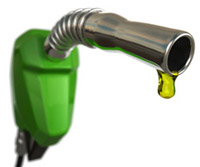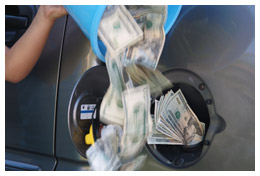Not too long ago it was hard to imagine a day when motorists would study gasoline and its pros and cons much like they research products such as milk or skin care products.
But that day has come, and it has been here for quite a few months.
Aside from price shopping – four dollars-plus per gallon will do that – car owners want to know which gas or additive will make their car run better, and which types may be damaging to a vehicle or the environment.
Marketing for Gas?
 Gas companies and refineries understand this well, and have even tied the value of their product into their marketing campaigns.
Gas companies and refineries understand this well, and have even tied the value of their product into their marketing campaigns.
Most every driver is familiar with the cute little cars that talk for Chevron and the Techron added to the gas it sells from stations.
Techron is a fuel deposit-control additive, that most auto parts stores sell, so car owners could choose to buy their gas anywhere and just add a small bottle of Techron every other fill-up.
But Chevron mixes it in with all the gas and touts it like some secret ingredient, like a hamburger joint’s “secret sauce.”
Do We Really Need High Octane?
For so many years, motorists treated gasoline like an inconvenient requirement to motor around, just like insurance.
They would treat insurance with a bit more care – since auto insurance payments are for long periods of time, from monthly to yearly, the payments used to be much higher than a trip to the local gas station.
 With gas prices rising faster than the media can report it, motorists are starting to realize the cumulative cost of filling up.
With gas prices rising faster than the media can report it, motorists are starting to realize the cumulative cost of filling up.
Consumers also are researching the costs and benefits of purchasing certain types of gasoline.
Many industry experts have said that the type of gas a person puts in a car does not matter…buy the cheapest available.
Others disagree. “Gas is not just gas,” a service center owner told The News Herald in Panama City, Florida, in April 2008.
Service-center industry participants should know, they witness fuel system problems, engine carbon buildup and similar problems attributed to poor fuel quality.
Those problems can become costly in terms of eventual repairs.
Many are directing motorists to seek gasoline with fuel detergent added, or to add it after purchasing from the pump.
Car owners can tap sources, such as , to learn about retailers that use more additives than the U.S. Environmental Protection Agency sets as a minimum requirement.
Gas is Cheaper in My Neighborhood
 You can talk all you want about the quality of a particular gasoline brand or type, but ultimately the overwhelming majority of motorists will choose what is most affordable.
You can talk all you want about the quality of a particular gasoline brand or type, but ultimately the overwhelming majority of motorists will choose what is most affordable.
There can be perplexing differences in pricing between filling stations just blocks away from each other.
Several reasons some stations charge more
- Zone pricing arranged by gas refineries to include cost of transport
- Higher rent in nicer neighborhoods and prime locations
- Addition of additives and fuel detergents
Several reasons some stations charge less
- Located in lower income communities
- Cash only locations don’t pay credit card fees
- Lower quality product
Something else that can come into play is brand perception, usually impacted by either marketing, the quality of the gasoline, or a company’s clean reputation over the years.
For example, Chevron has arranged a website and has hired celebrity singers to tout its Techron; and some industry experts say Shell is trusted by consumers, thanks in part at least to television commercials promoting its environmental friendliness.
All these factors can influence the price of a gallon of gasoline you see on a street-corner sign. What’s most important – higher octane, more additives, lowest price? – is totally up to each individual motorist.
